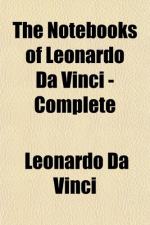Those who are annoyed by sickness at sea should drink extract of wormwood.
855.
To keep in health, this rule is wise: Eat only when you want and relish food. Chew thoroughly that it may do you good. Have it well cooked, unspiced and undisguised. He who takes medicine is ill advised.
[Footnote: This appears to be a sketch for a poem.]
856.
I teach you to preserve your health; and in this you will succed better in proportion as you shun physicians, because their medicines are the work of alchemists.
[Footnote: This passage is written on the back of the drawing Pl. CVIII. Compare also No. 1184.]
XV.
Astronomy.
Ever since the publication by Venturi in 1797 and Libri in 1840 of some few passages of Leonardo’s astronomical notes, scientific astronomers have frequently expressed the opinion, that they must have been based on very important discoveries, and that the great painter also deserved a conspicuous place in the history of this science. In the passages here printed, a connected view is given of his astronomical studies as they lie scattered through the manuscripts, which have come down to us. Unlike his other purely scientific labours, Leonardo devotes here a good deal of attention to the opinions of the ancients, though he does not follow the practice universal in his day of relying on them as authorities; he only quotes them, as we shall see, in order to refute their arguments. His researches throughout have the stamp of independent thought. There is nothing in these writings to lead us to suppose that they were merely an epitome of the general learning common to the astronomers of the period. As early as in the XIVth century there were chairs of astronomy in the universities of Padua and Bologna, but so late as during the entire XVIth century Astronomy and Astrology were still closely allied.
It is impossible now to decide whether Leonardo, when living in Florence, became acquainted in his youth with the doctrines of Paolo Toscanelli the great astronomer and mathematician (died 1482_), of whose influence and teaching but little is now known, beyond the fact that he advised and encouraged Columbus to carry out his project of sailing round the world. His name is nowhere mentioned by Leonardo, and from the dates of the manuscripts from which the texts on astronomy are taken, it seems highly probable that Leonardo devoted his attention to astronomical studies less in his youth than in his later years. It was evidently his purpose to treat of Astronomy in a connected form and in a separate work (see the beginning of Nos._ 866 and 892_; compare also No._ 1167_). It is quite in accordance with his general scientific thoroughness that he should propose to write a special treatise on Optics as an introduction to Astronomy (see Nos._ 867 and 877_). Some of the chapters belonging to this Section bear the title “Prospettiva” (see Nos. 869 and 870_), this being the term universally applied at the time to Optics as well as Perspective (see Vol. I, p._ 10, note to No. 13, l. 10_)_.




